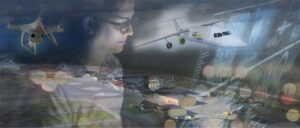Research project with electric aircraft and drones for a prosperous countryside
 The EDIS research project – electric aircraft and drones in the service of the community – will show the possibilities of using drones and electric aircraft to improve the conditions for community service and transport in areas with large distances and limited access to critical social functions. The project is run by LFV, Katla Aero, Flypulse, Guideline Geo and Luleå University of Technology and is funded by the Swedish Transport Administration.
The EDIS research project – electric aircraft and drones in the service of the community – will show the possibilities of using drones and electric aircraft to improve the conditions for community service and transport in areas with large distances and limited access to critical social functions. The project is run by LFV, Katla Aero, Flypulse, Guideline Geo and Luleå University of Technology and is funded by the Swedish Transport Administration.
– The project will show how new drone technology can be used to achieve a more sustainable and efficient aviation business and show the benefit primarily in sparsely populated regions. This in turn generates more knowledge for the Swedish Transport Administration, LFV, the Swedish Transport Agency and other actors, and in extension to the entire community. EDIS is driving development and legislation, which is essential for a faster transition to a fossil-free vehicle fleet, says Björn Wahlström, LFV’s research manager.
In industries such as forestry and power supply, interest in collaboration with the new technology has increased.
Research center at Örnsköldsvik Airport
In January 2021, LFV’s new test and demonstration facility LFV Aviation Research Center (LARC) will be completed at Örnsköldsvik Airport. Discussions are also ongoing with the municipalities of Åsele and Storuman about becoming part of the LARC cluster. It gives the research operations a geographically dispersed test and validation arena based in Örnsköldsvik and satellite sites in Åsele and Storuman.
It will provide opportunities for collaboration between industry, academia and society in the areas of airport operations, electric aviation and airspace issues and has a planning horizon of at least ten years. In the fall of 2019, LARC was used for demonstration of autonomous ground vehicles as part of the work on the vision of the autonomous airport.
Funded by the Swedish Transport Administration
The EDIS project is funded by the Swedish Transport Administration and is the first to use the LFV Aviation Research Center as the home arena for a project in electric aviation. For upcoming demonstrations in a real environment, collaborations are also initiated with Åsele municipality and Storuman municipality. Since the project is based on electric powered aircraft and drones, it also contributes to reduced climate impact. The project will also identify the requirements that unmanned aviation will impose on airspace and air traffic management.
Emergency services and surveillance in sparse areas mean long distances. Here, drones have the potential to contribute to a large number of different functions. Together with general issues related to airspace, security, communication and remote control, these functions are the focus of the EDIS project. The results will serve as a catalyst for other projects in the areas of automation (execution of programmed tasks), remote control and electric aviation for the future.
– Within the EDIS project, we have gathered Swedish excellence in relevant areas to demonstrate opportunities for improved community service for people in sparsely populated areas who want to feel secure in the environment in which they are located. The hospitality industry will also be able to benefit from the technology that we will showcase. The technology differs significantly from other ongoing drone projects, including the use of machines with potential for speeds of 250 km / h and over 10 km range, says Björn Wahlström.
Article Source: LFV














